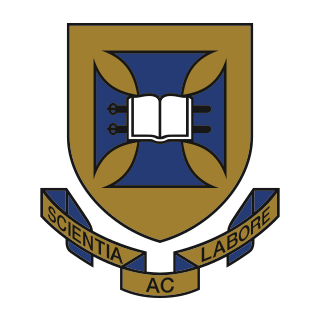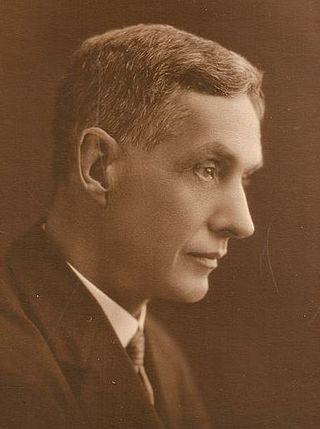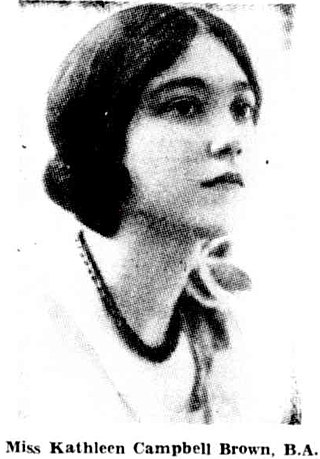
The University of Queensland is a public research university located primarily in Brisbane, the capital city of the Australian state of Queensland. Founded in 1909 by the Queensland parliament, UQ is one of the six sandstone universities, an informal designation of the oldest university in each state. UQ is also a founding member of edX, Australia's leading Group of Eight and the international research-intensive Association of Pacific Rim Universities.

St Lucia is a riverside suburb in the City of Brisbane, Queensland, Australia. The University of Queensland is the main attraction of St Lucia, with the university and its residential colleges covering a large proportion of the suburb. According to the 2021 census, St Lucia had a population of 12,220 people.
The QUT Business School is one of six faculties at the Queensland University of Technology. It is home to the QUT Graduate School of Business, as well as four-discipline focused schools; the School of Accountancy, the School of Advertising, Marketing and Public Relations, the School of Economics and Finance, and the School of Management. In 2015, the QUT Business School had enrolled a total of 8,971 students across the faculty, including 2,962 international students.

The Eleanor Schonell Bridge, better known as the Green Bridge, is a 390-metre (1,280 ft)-long cable-stayed bridge which crosses the Brisbane River between Dutton Park and the University of Queensland's St Lucia campus, connecting the UQ Lakes and Dutton Park Place busway stations. Its deck is 185 metres long, 20 metres wide and about 18 metres above the river's surface. The bridge was opened on 17 December 2006, and is the first bridge in Australia exclusively designed for buses, cyclists and pedestrians. The bridge cost $55.5 million to construct.

John Anthony Hay was an Australian academic. He was Vice-Chancellor of Deakin University and the University of Queensland from 1996 to 2007.

UQ St Lucia ferry wharf is located on the southern side of the Brisbane River serving the Brisbane suburb of St Lucia in Queensland, Australia. It is served by RiverCity Ferries' CityCat services.

The UQ Law School is the law school of the University of Queensland in Brisbane, Australia. Founded in 1936, UQ law school is the sixth oldest law school in Australia and the oldest operating in Queensland.
The University of Queensland Business School is the business school of the University of Queensland, located in Brisbane, Australia. There are seven areas of research expertise across UQ Business School: Accounting, Business Information Systems, Finance, Management, Marketing, Strategy and Tourism.
Shazia Sadiq is an Australian computer scientist and academic. She is a Professor of Computer Science at the University of Queensland.

Jeremiah Joseph Stable (1883–1953) was the first professor of English at the University of Queensland in Brisbane, Queensland, Australia.
Frederick Walter Robinson (1888–1971) was an Australian academic at the University of Queensland. He was the founder of the university's Fryer Library and one of the instigators of the John Oxley Library.

John Lundie Michie (1882–1946) was the first professor of Classics at the University of Queensland in Brisbane, Queensland, Australia.

Ethel Harriet Raybould B.A., M.A. (1899–1987), was the University of Queensland's first female Mathematics Lecturer who taught at the University from 1928 to 1955. She was one of the University's most generous benefactors with her bequest to the University of almost $1 million upon her death supporting fellowships, prizes, and a teaching facility.

Heron Island Research Station is a marine research station located on Heron Island, an island within the Great Barrier Reef Marine Park, 80 km from Gladstone, off the coast of Queensland, Australia. It is located at the leeward end of a coral cay on a 10 x 5 kilometre platform reef. Although the island had been used as a turtle cannery in the 1920s, after this was abandoned, it was taken over as a resort in the 1930s, by Captain Christian Poulsen. A number of researchers travelled to the island from the 1930s using the resort facilities. The island became a National Park in 1943, and following the end of World War II, saw the first groups of university students from the University of Queensland arrive. Today the island is divided into three sections - the resort, research station and National Park.

Kathleen Campbell-Brown (1903–1996) was a lecturer in French at the University of Queensland for almost 30 years.

The Institute of Continuing & TESOL Education (ICTE) is a university located in Brisbane, Australia specialising in English language courses, teacher training, professional development, and English language testing.

The Queensland Brain Institute (QBI) is an Australian neuroscience research institute, located in Brisbane at the St Lucia campus of The University of Queensland (UQ). Founding director Professor Perry Bartlett established the QBI in 2003 with assistance from The University of Queensland, Queensland State Government, and Chuck Feeney, founder of The Atlantic Philanthropies. The purpose-built facility was commissioned in 2004 and on 19 November 2007, the building was opened by former Queensland Premier Anna Bligh.
Elizabeth Catherine Usher AO (1911–1996) was a speech disorders therapist and academic. She was the first person from Queensland to study speech therapy.
Nina Mikhailovna Christesen pioneered the study of Russian in Australia and founded the Department of Russian Language and Literature at the University of Melbourne in 1946.
Vitaly de Gzell (1908-1977) was a Russian-Australian architect, who practised in Queensland in the modernist tradition.












